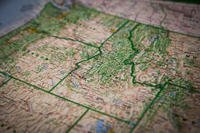Let"s face it: Doing your taxes is about as exciting as mowing your lawn. But, we all have to do it. And Uncle Sam doesn't make it easy. The U.S. tax code literally fills thousands of pages. Thankfully, you don't need to read them all to stay on top of your taxes. Here are five things that can make doing your taxes "less taxing" as Tax Day, April 15, approaches.
- First, understand what kind of "Taxes" you're paying to begin with. Most people think about taxes as one big jug of "uggh." But there are several different types of taxes that we each pay: Federal, State and Local income taxes, Social Security taxes (6.2 percent of your income up to $97,500), and Medicare taxes (1.45 percent of your income with no cap). If you're self-employed you have to pay twice as much in Social Security and Medicare; as you pay both employer and employee bits.
- Now let's talk about what you can do to reduce those taxes. The first way is through tax deductions. The most common ones are your property tax, charitable contributions, mortgage interest, student loan interest, as well as medical and non-reimbursed job-related expenses that exceed a certain portion of your income. Three absolutely critical things to know about deductions:
- They're not automatic. You have a choice between a "standard deduction" and taking an "itemized deduction". For instance, to get your mortgage interest deduction or a write-off for a non-reimbursed, work-related expense you have to list out your deductions on your tax return. Believe it or not, more than two-thirds of people don't do this; they just take the standard deduction.
- Deductions do not reduce your tax bill dollar by dollar. They reduce it by your marginal tax rate. So if you're in the 25 percent tax bracket and you "deduct" or "write-off" something worth $1,000 you save $250 not the $1,000. - An even better way to cut back on your tax bill is through tax credits. These do represent a dollar-for-dollar reduction of your tax bill. The most common tax credits are child or dependent care tax credits, education tax credits, energy tax credits, and earned income tax credits.
- You don't need to go it alone. Visit www.aicpa.org to find a local accountant or to big chains like H&R Block or Jackson Hewitt. One of the first questions you should ask your tax preparer is if you qualify for any tax credits and if you can itemize your deductions.
- What papers do you need to save? Save all supporting materials that you use to create your tax returns for at least six years. You don't have to, but I suggest saving copies of your final tax returns forever. They can come in handy down the road if you take a break from the work place to raise children and then you want to take out a loan to start a business and you want to show your previous earning power.
For more financial information or tax tips, visit military.com's Taxes channel.




